
A Tribute to Father Matthew Lamb
Published by Michael Novak at Patheos.com on February 10, 2015
Adapted from remarks given February 7, at the closing dinner of the annual conference of the Aquinas Center for Theological Renewal at Ave Maria University in Florida. The conference celebrated the university’s graduate program in theology, alumni of which presented very moving and learned papers. This year’s conference paid special tribute to Father Matthew Lamb, the bold and pioneering founder of the program.
* * *
As a quite young monk from the Trappist monastery at Conyers, Georgia, the neatly tonsured Father Matt arrived in Rome at the middle point of the Vatican Council in 1964, after the first two sessions, but before the dramatic final two. Like many other excited Catholics in America, Father Matt had been eagerly keeping up-to-date (that is, aggiornamento’d) on every morsel of information about the Council, even the juicy tidbits.
One cannot exaggerate how thrilling those days were. Television coverage almost every day. Front-page stories in The New York Times, above the fold.
Yes, Father Lamb had been closely following the suspenseful first year at Vatican II, not least the shadowy Vatican intrigue reported by the mysterious “Xavier Rynne” in The New Yorker, and gathered up from the scuttlebutt – to use a technical theological term of that time – the buzz that hung above the tables in the fragrant coffee shops along the Via della Conciliazione, and inside the restaurants from the “Hilton on the Hill” (where most of the American bishops stayed) to Piazza Navona, famous for stunning scenes starring Marcello Mastroianni and Sophia Loren.
Sadly, nontheological scuttlebutt was at times at the very center of the Council, at least as reporters saw things. In 1964 I was among those reporters. I was working for Time that year, and Karen and I had an unlimited expense account so that we could take as many “sources” as we could out to lunch or dinner for interviews and wide-ranging conversations on the state of the Church.
If we could have known in those days that the young Father Lamb would become such an important force in the post-Council Church, and would found the theology department at Ave Maria University, and if we knew where to find him, we would have taken him to such a restaurant as neither he nor we could ever afford to enter again.
Not long after his days in Rome, Father Matt went on to further and then further studies. It seemed in those days as if further studies never ended. Matt studied one philosophy of history after another, and then the metaphysics they implied, then the different horizons employed, the higher viewpoints, the emergent probabilities. (By the way, that’s why Father Matt can always think of another higher viewpoint, horizon, meta-meta . . . and has trouble finishing an explanation.)
Another thing Matt can’t finish – he never forgets his friends. Once, he took a train from Germany back to Rome to visit Fred Lawrence and Fred’s wife, Sue. Fred had left the seminary, but kept up his studies in Rome under Bernard Lonergan. That’s how Fred and Father Matt first met.
Well, one week a few years later, Sue had to stay in the hospital during a scary pregnancy episode, leaving Fred at home with two-year-old Dyer. Like most males, Fred was not quite up to being both mother and father. (How is it most wives seem to do both?) Father Lamb volunteered to help out. He had no idea what he was getting into.
If Fred felt incompetent that week, Father Lamb became completely bewildered. For family chaos the Trappists had not prepared him. A family kitchen was nothing like the world of silence and contemplation. Eventually Father Lamb announced that he must leave. Fred would be better off without him: Be easier to care for one infant, than one infant plus Father Lamb.
When he left Father told Fred and Sue that they could contract with the North American College for a stipend to have a few seminarians come up to help them with their children – that would give them what Newman called a “real apprehension” of the challenges of marriage and children, and why Our Lord made it a sacrament of His self-sacrificing love for His Body, the Church.
Those are days Father Lamb says he truly verified his vocation: Celibacy, pure and simple. Some persons are meant for celibacy. (And by the way, Fred still agrees that after Father left, his little son settled down, at least as much as boys of two ever do.)
After Germany, Father was called to Marquette, where he fell into heavy-lifting writing and editing – including a memorable festschrift for Father Lonergan. Matt’s reputation kept growing. More and more people couldn’t follow Father Lamb’s arguments – Lonergan does that to people – although they knew Matt was quite deep, and holy, and his writing always sparkled with little diamonds of spiritual wisdom.
Then Father Lamb was invited to Boston College. There he met and inspired a marvelous company. With his old friend Fred Lawrence, and Father Joe Flanagan, S.J., who had also studied under Lonergan, and Father Ernest Fortin, the indomitable Straussian, Father Romanus Cessario, O.P., and Mary Ann Glendon of Harvard, he formed a monthly study group centered on Thomas Aquinas’s Summa Theologiae. Father Lonergan used to complain to Matt that too many had failed to devote time to studying Aquinas.
In the theology department at B.C. Father Lamb faced some notable theological dissent. Some seemed to take Rome as bête-noire. In fact, there was a rumor around the Boston area that Father Lamb once petitioned the president of B.C. to put into practice the principles of Affirmative Action, by hiring at least one ethicist in the theology department who agreed with the Magisterium.
Recalling his own days in theological education, when he was expected to study theological classics in Hebrew, Greek, Latin, French, and German – not to mention Italian, for reading La Civiltà Cattolica and other Magisterial documents – Father Lamb began to doubt whether American theologians of the future would ever be prepared to pass on the Catholic theological tradition in its fullness. How will they ever be able to grasp the terms of the Greek and Latin Fathers, the millennium and a half of theology after Christ, official Church teaching worded in Latin, and even the rest of the Catholic world outside the U.S.?

That is how Father Lamb began to dream of building a place where deeper understanding could be reached. Ave Maria is still moving toward this goal. But even now our graduates are giving a good account of themselves. Most are finding positions rather quickly, while the demand for them keeps growing – thanks to Father Matt’s vision, insistence, and perseverance.
In person, too, Father Lamb is a wise counsellor. Doesn’t get too excited about difficulties. Urges prayer, patience, and time, time, time. Employs his long experience and the fruits of many inner battles. Knows the mountains and the valleys of the soul in its voyages, its darknesses and lights. Just over ten years ago, he showed immense courage in moving from Boston College to seemingly endless tomato fields in southwest Florida, above which the great Oratory now rises up over large expanses of lawn and campus buildings and hundreds of homes, together reminding one of Tuscany.
This past weekend, the mature, profound, deep, and spiritual papers presented by these sixteen Ave Maria scholars now teaching in other universities and seminaries are a living monument, and a lasting one, to Father Lamb’s courage, depth, and wisdom. His maturing students showed also that they learned well the habit of theological friendship.
This is my way of thinking of Father Lamb: contemplata aliis tradere. He has passed along to others his own contemplation in the presence of the Love of the Holy Trinity, where all theology begins.










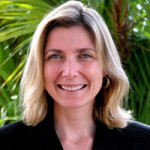
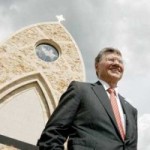
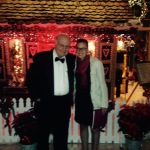


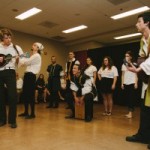
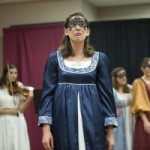 Then, too, one dare not overlook the superabundance of talent at Ave Maria, especially among the young women. So rich is the female talent that a full second cast of the lead parts for women took its turn over the three weeks of performances. Each one of the second cast kept the joy of the play alive when her chance came, particularly Leslie Nagel, who played an entirely different Beatrice, to great and moving effect.
Then, too, one dare not overlook the superabundance of talent at Ave Maria, especially among the young women. So rich is the female talent that a full second cast of the lead parts for women took its turn over the three weeks of performances. Each one of the second cast kept the joy of the play alive when her chance came, particularly Leslie Nagel, who played an entirely different Beatrice, to great and moving effect.